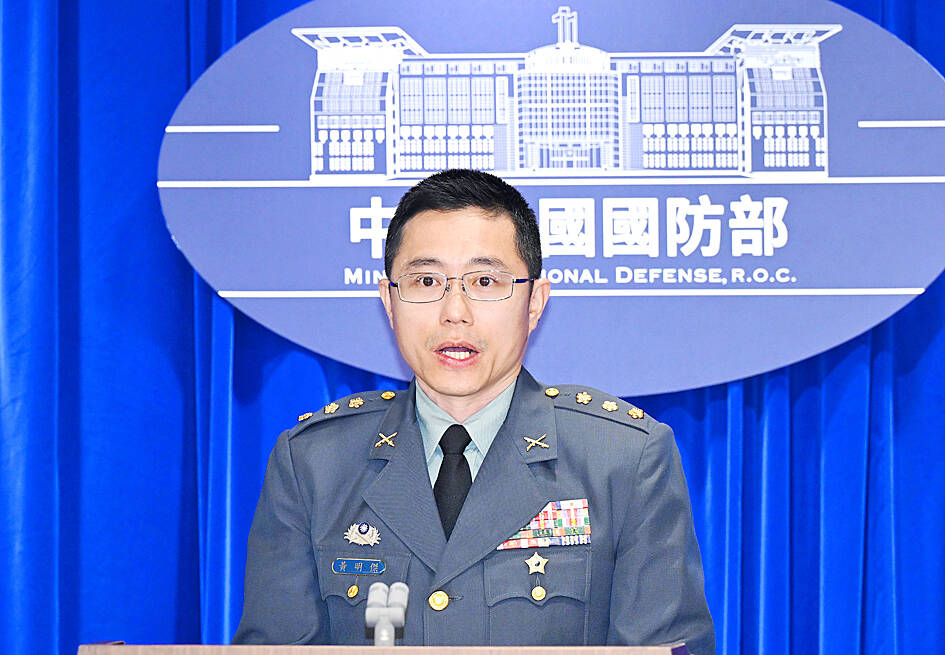Taiwanese should have greater faith in the government’s investigation into the capsizing of a Chinese vessel that resulted in the death of two Chinese fishers last week, the Coast Guard Administration (CGA) said yesterday, adding that Taiwan abides by the rule of law.
On Wednesday last week, a Chinese speedboat was spotted trespassing in “prohibited” waters within 1.1 nautical miles (2km) of the east coast of Kinmen. It fled after refusing the coast guard’s request to board the vessel, setting off a chase that led to the boat capsizing, with two Chinese fishers dying. Two survivors were deported back to China on Tuesday after Kinmen prosecutors questioned them.
Kinmen District Chief Prosecutor Shih Chia-jung (施家榮) said that the office cannot confirm or deny whether a CGA ship had collided with the Chinese boat multiple times during the pursuit.

Photo: Liao Chen-huei, Taipei Times
A preliminary investigation showed that the CGA vessel did not have ship-borne recording equipment, the Kinmen District Prosecutors’ Office said.
The crew member tasked with recording could not access the handheld equipment due to the high-speed chase, while the captain was occupied with navigation and two other crew were preparing to board the speedboat, the coast guard said.
The CGA said it would assist the family members of the deceased fishers, and would comply with investigations.
In a regional press call, US National Security Adviser Jake Sullivan said that Washington has been clear on its stance on maintaining peace and stability across the Taiwan Strait.
Although he declined to comment specifically on the Kinmen incident, he said that the US is “against any kind of action, by any party, that undermines that peace and stability.”
At a news briefing on Tuesday, US Department of State spokesman Matthew Miller said that Washington is closely monitoring Beijing’s actions, while it continues to “urge restraint and no unilateral change to the status quo.”
The US also urged China to engage in meaningful dialogue with Taiwan to reduce the risk of miscalculation, Miller said.
In Taipei, the Ministry of National Defense said that it has no intention to “directly intervene” in an ongoing maritime dispute with Beijing to avoid escalating tensions.
Ministry joint operations planning section Captain Lee Chang-fu (李昌富) said the case that triggered the dispute is under the jurisdiction of the CGA and is under investigation.
The military is keeping a close eye on the situation and would let the CGA do its job based on the principles of “no direct involvement, no escalating of tension,” he said.
The military has elected not to bolster defenses in the Kinmen, Matsu and Penghu islands following the incident, Lee said, adding that the military has contingency measures in place should tensions with China escalate.
“Our navy and the defense forces of the outlying islands will conduct exercises and preparations in response to the situation,” ministry spokesperson Sun Li-fang (孫立方) said. “In the face of the threat, we hope the situation can be effectively and properly handled.”
Ministry intelligence officer Colonel Huang Ming-chieh (黃明傑) said there was currently “nothing abnormal” in China’s military movements around Taiwan.
Additional reporting by Reuters

SECURITY: As China is ‘reshaping’ Hong Kong’s population, Taiwan must raise the eligibility threshold for applications from Hong Kongers, Chiu Chui-cheng said When Hong Kong and Macau citizens apply for residency in Taiwan, it would be under a new category that includes a “national security observation period,” Mainland Affairs Council (MAC) Minister Chiu Chui-cheng (邱垂正) said yesterday. President William Lai (賴清德) on March 13 announced 17 strategies to counter China’s aggression toward Taiwan, including incorporating national security considerations into the review process for residency applications from Hong Kong and Macau citizens. The situation in Hong Kong is constantly changing, Chiu said to media yesterday on the sidelines of the Taipei Technology Run hosted by the Taipei Neihu Technology Park Development Association. With

CARROT AND STICK: While unrelenting in its military threats, China attracted nearly 40,000 Taiwanese to over 400 business events last year Nearly 40,000 Taiwanese last year joined industry events in China, such as conferences and trade fairs, supported by the Chinese government, a study showed yesterday, as Beijing ramps up a charm offensive toward Taipei alongside military pressure. China has long taken a carrot-and-stick approach to Taiwan, threatening it with the prospect of military action while reaching out to those it believes are amenable to Beijing’s point of view. Taiwanese security officials are wary of what they see as Beijing’s influence campaigns to sway public opinion after Taipei and Beijing gradually resumed travel links halted by the COVID-19 pandemic, but the scale of

A US Marine Corps regiment equipped with Naval Strike Missiles (NSM) is set to participate in the upcoming Balikatan 25 exercise in the Luzon Strait, marking the system’s first-ever deployment in the Philippines. US and Philippine officials have separately confirmed that the Navy Marine Expeditionary Ship Interdiction System (NMESIS) — the mobile launch platform for the Naval Strike Missile — would take part in the joint exercise. The missiles are being deployed to “a strategic first island chain chokepoint” in the waters between Taiwan proper and the Philippines, US-based Naval News reported. “The Luzon Strait and Bashi Channel represent a critical access

Pope Francis is be laid to rest on Saturday after lying in state for three days in St Peter’s Basilica, where the faithful are expected to flock to pay their respects to history’s first Latin American pontiff. The cardinals met yesterday in the Vatican’s synod hall to chart the next steps before a conclave begins to choose Francis’ successor, as condolences poured in from around the world. According to current norms, the conclave must begin between May 5 and 10. The cardinals set the funeral for Saturday at 10am in St Peter’s Square, to be celebrated by the dean of the College